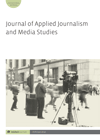
Full text loading...

 , Fany Rojas-Noa1
, Fany Rojas-Noa1 , Kelly Hernández-Sánchez2
, Kelly Hernández-Sánchez2 , Inés Liliana Ramírez-Durand3
, Inés Liliana Ramírez-Durand3
Democracy is a complex political model. It is constituted through criteria such as the existence of solid institutions, the development of transparent electoral processes, dissemination of political culture, free citizen expression, among others. For this reason, the existence of a wide spectrum of countries with full, deficient, hybrid or authoritarian democratic qualities is plausible. Such is the case of Latin America, a region in which several countries have fallen in the last two groups. For this reason, this article will offer an overview of the situation in three Latin American countries (Colombia, Peru and Venezuela), considering the role of independent journalism, the situation they are going through and their strategies in deficit democracy, hybrid regime and dictatorial situation. For this purpose, system thinking will be used as a way of representing the role with audiences, the plurality of approaches and the credibility of the journalistic function.

Article metrics loading...

Full text loading...
References


Data & Media loading...
Publication Date:
https://doi.org/10.1386/ajms_00133_1 Published content will be available immediately after check-out or when it is released in case of a pre-order. Please make sure to be logged in to see all available purchase options.